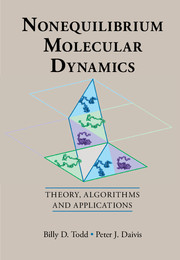Book contents
- Frontmatter
- Contents
- Preface
- 1 Introduction
- 2 Nonequilibrium Thermodynamics and Continuum Mechanics
- 3 Statistical Mechanical Foundations
- 4 Temperature and Thermodynamic Fluxes
- 5 Homogeneous Flows for Atomic Fluids: Theory
- 6 Homogeneous Flows for Atomic Fluids: Applications
- 7 Homogeneous Heat and Mass Transport
- 8 Homogeneous Flows for Molecular Fluids
- 9 Inhomogeneous Flows for Atomic Fluids
- 10 Confined Molecular Fluids
- 11 Generalised Hydrodynamics and Slip
- Bibliography
- Index
11 - Generalised Hydrodynamics and Slip
Published online by Cambridge University Press: 30 March 2017
- Frontmatter
- Contents
- Preface
- 1 Introduction
- 2 Nonequilibrium Thermodynamics and Continuum Mechanics
- 3 Statistical Mechanical Foundations
- 4 Temperature and Thermodynamic Fluxes
- 5 Homogeneous Flows for Atomic Fluids: Theory
- 6 Homogeneous Flows for Atomic Fluids: Applications
- 7 Homogeneous Heat and Mass Transport
- 8 Homogeneous Flows for Molecular Fluids
- 9 Inhomogeneous Flows for Atomic Fluids
- 10 Confined Molecular Fluids
- 11 Generalised Hydrodynamics and Slip
- Bibliography
- Index
Summary
Generalised Hydrodynamics
The realisation that classical Navier-Stokes hydrodynamics would fail at molecular length-scales is not new. It has long been expected that generalised hydrodynamics could play an important part in the prediction of transport properties of inhomogeneous fluids. In 1983 Alley and Alder [321] noted that generalised hydrodynamic models could be very useful to the development of molecular-level predictive tools. In generalised hydrodynamics, the transport coefficients are no longer regarded as constants, nor are they simply material properties of a fluid at the local thermodynamic state point. Transport now becomes a fully nonlocal property of fluids, and likewise all the transport “coefficients” now become nonlocal in both time and space. In other words, the transport “coefficients” are now replaced by kernels and the governing constitutive equations are integral functions (convolutions) over both space and time. The kernels themselves now have both a wavelength and frequency dependence. In fact, significant progress in the development of generalised hydrodynamics was made in the 1970s by Akcasu and Daniels [369] and Ailawadi et al. [370]. The books by Boon and Yip [371], Eu [372] and Hansen and McDonald [61] also treat this subject in considerable detail, and we refer readers to these references for a much more thorough theoretical foundation.
Our purpose is to show how generalised hydrodyamics can be used as a predictive tool for inhomogeneous fluids. In particular, we will show how classical Navier-Stokes hydrodynamics breaks down at molecular length scales when the spatial variation in the driving thermodynamic force (e.g. the strain rate) is significant over the range of molecular interactions. Such conditions can occur not only for highly confined fluids, but also for fluids under shock conditions [373–375], where moment and gradient expansions originally derived from gas kinetic theory are commonly employed [372, 376]. Nonlocal effects are also observed in shear-banding phenomena [377], micellar solutions [378], Brownian suspensions of rigid fibres [379] and jammed glassy systems [380] and may well play a significant role in turbulence.
We will first demonstrate where breakdown in classical theory occurs in both confined fluids and systems in which the curvature in the strain rate exceeds the width of the relevant transport kernel. We then express the governing constitutive equation in its generalised form and demonstrate several techniques to compute the transport kernels. Once the kernels are computed, it is a straightforward matter to use them to predict properties of interest.
- Type
- Chapter
- Information
- Nonequilibrium Molecular DynamicsTheory, Algorithms and Applications, pp. 306 - 334Publisher: Cambridge University PressPrint publication year: 2017



